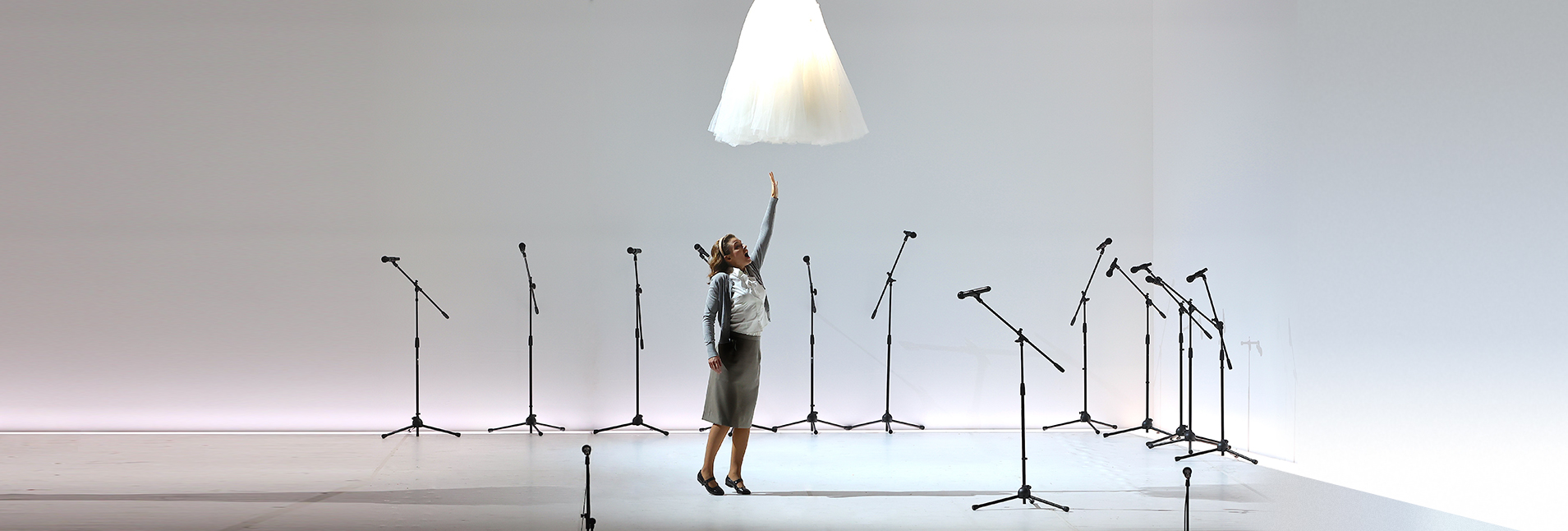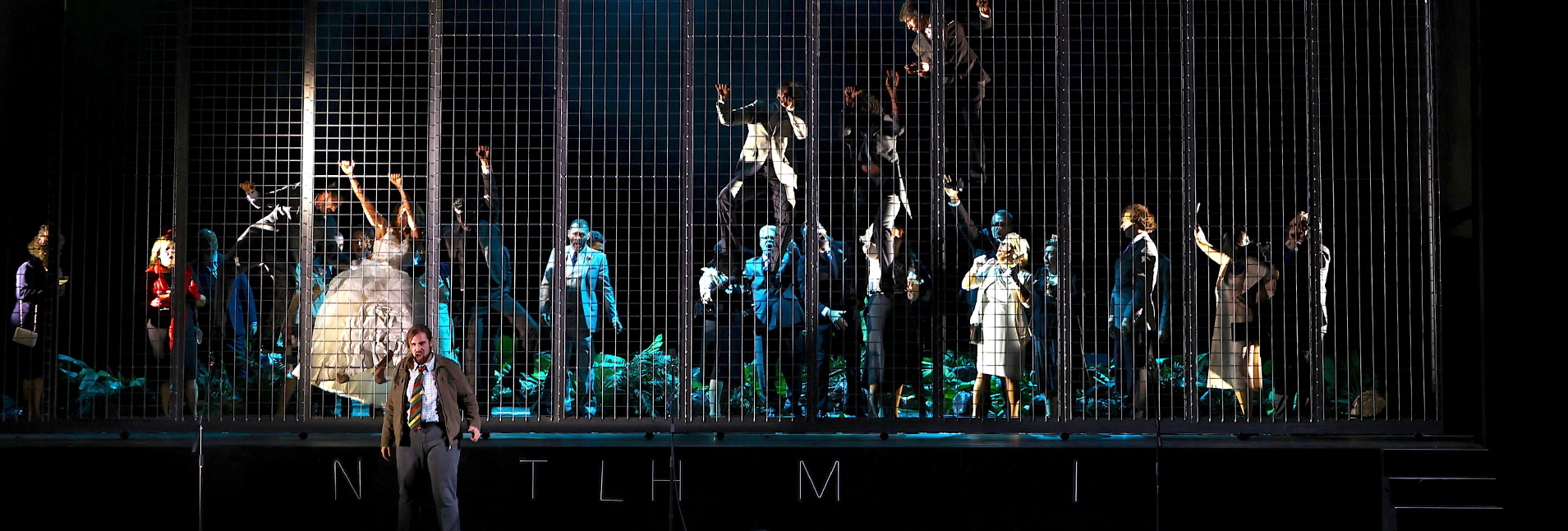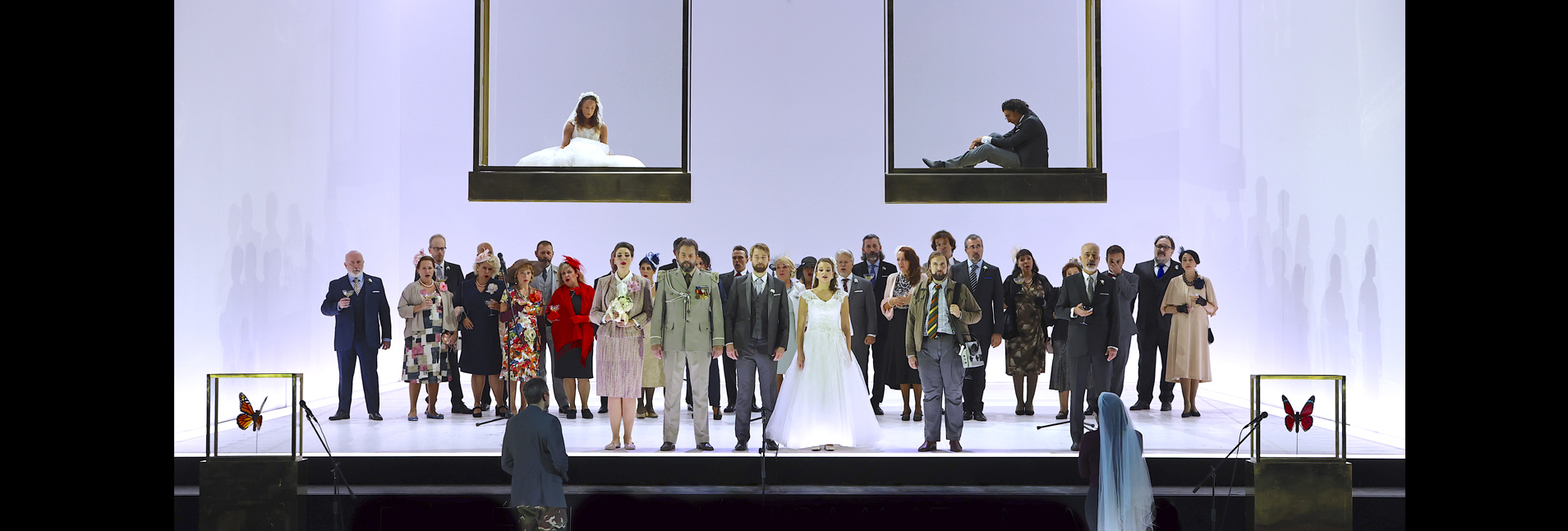Opéra-comique in two acts
Music by Hector Berlioz
Libretto by Hector Berlioz, from Much Ado About Nothing by William Shakespeare
__________________________
PLAYBILL
Don Pedro Nicola Ulivieri
Claudio Yoann Dubruque
Bénédict Julien Behr/Giorgio Misseri (29, 5)
Léonato Gérald Robert-Tissot
Héro Benedetta Torre/Francesca Benitez (29, 4, 5, 6)
Béatrice Cecilia Molinari/Sofia Koberidze (29, 5)
Ursule Eve-Maud Hubeaux/Gaia Petrone (29, 5)
Somarone Ivan Thirion
Mimi: Amedeo Podda (chimpanzee), Alessandro Percuoco (Adam), Miryam Tomè (Eve), Simone Campisi, Fabrizio Carli, Luca De Rinaldo, Humberto Jimenez Rios
Conductor and orchestrator Donato Renzetti
Director Damiano Michieletto
Scenic designer Paolo Fantin
Costume designer Agostino Cavalca
Coreography Chiara Vecchi
Lighting design Alessandro Carletti
New staging by Opéra de Lyon
in collaboration with Fondazione Teatro Carlo Felice di Genova
National premiere
Orchestra, chorus and Technicians of Opera Carlo Felice Genova
Claudio Marino Moretti, Chorusmaster
Scenic staging director Luciano Novelli
Stage music director Paloma Brito
Hall masters Sirio Restani, Antonella Poli
Stage masters Andrea Gastaldo, Anna Maria Pascarella
other Choir Master Patrizia Priarone
Master to the lights Silvia Gasperini
Master to supertitles Simone Giusto
Music archive manager Simone Brizio
Stage manager Alessandro Pastorino
Deputy stage manager Giorgio Agostini
Console handling manager Andrea Musenich
Machinist foreman Gianni Cois
Deputy foreman electricians Daniele Malcontenti
Tooling foreman Tiziano Baradel
Head of audio/video department Walter Ivaldi
Department head of tailoring, shoemaking, makeup and wigs Elena Pirino
Assistant director Elisabetta Acella
Scene assistant Gianluca Cataldo
Costume assistant Camilla Masellis
Make-up co-ordinator Raul Ivaldi
Sets, props and costumes Opéra de Lyon
Footwear Epoch
Wigs Mario Audello (Turin)
Sopratitoli Prescott Studio
Opera in brief
by Ludovica Gelpi
Béatrice et Bénédict is the third and last musical theatre opera composed by Hector Berlioz. It was preceded by Benvenuto Cellini (1834-38) and Les Troyens (1856-58). The composition of Béatrice et Bénédict is set at a particular, almost emblematic moment in Berlioz’s career, who had found in musical theatre – particularly with Les Troyens – a particularly suitable channel for the realisation of his idea of music, in which formal tradition and stylistic innovation found their place.
The idea of setting Shakespeare’s text to music Much ado about nothing was born very early, as Berlioz wrote to his friend Joseph d’Ortigue in a letter of 1833: ‘By the way, I am about to write a very gay Italian opera on Shakespeare’s play Molto rumore per nulla. For this occasion, I would ask you to lend me the volume containing this text’. However, it was much later, in 1860, that Berlioz took the opportunity to compose this very gay Italian opera, Béatrice et Bénédict, commissioned by Edouard Bénazet for the inauguration of the new theatre in Baden-Baden.
The early 1960s constitute, in Berlioz’s parable of ups and downs, the beginning of the definitive decline. Not yet sixty years old, but having aged very prematurely, the composer has frail health and lives constantly at the mercy of various ailments. Moreover, these were the years in which contemporaries saw fellow friend and rival Richard Wagner as the main reference for the ‘music of the future’. At the Paris Opéra, Tannhäuser was staged to great acclaim, while Berlioz had not yet published his Troyens.
In light of the timing of the commissioning of Béatrice et Bénédict, the energy and vitality with which Berlioz devoted himself to this work is quite surprising. The composer chooses a text that he has known and loved since his youth, and decides to render it musically through the genre of opéra-comique. The Shakespearian play needs multiple and substantial cuts in order to be transposed into the formal scheme and timeframe of the two-act opéra-comique. The plot is thus greatly simplified, unfortunately also at the expense of the psychological depth of the characters. The focus shifts from the love of Claudio and Héro to the relationship of hate and love of our protagonists; the absence of some secondary characters is resolved with the introduction of the chapel master Somarone, who in fact constitutes the main comic element of the story. Musically, Berlioz does not deny his imaginative talent as an orchestrator; the solutions adopted are varied and innovative, resulting in a richly nuanced and colourful ensemble. For the most part, the music remains well within the established formal canons.
Béatrice et Bénédict was staged on 9 August 1862, was a unanimous success, and was revived on several occasions. It is, however, Berlioz’s last great composition, and he spends his remaining years travelling in Europe and Russia, as far as his illness permits, and is welcomed everywhere with great warmth. In 1863 he succeeded in having Les Troyens printed at his own expense, only to see it performed again in Baden-Baden. Berlioz died on 8 March 1869. The fortunes of Béatrice et Bénédict have been uncertain ever since; despite the positive initial reception and the even greater notoriety achieved by Berlioz in the following years, it remains an underrepresented title even in France.





